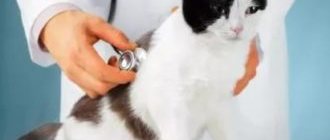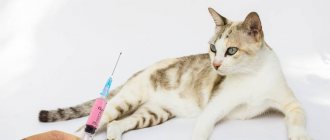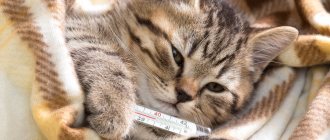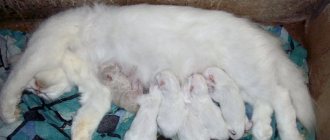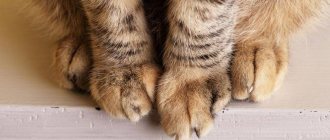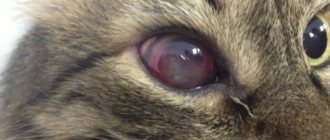Diseases of the digestive system and gastrointestinal tract in general are always a strong blow to the animal’s body. Diseases are further complicated by the fact that the same symptoms coincide with a large number of completely different diseases, which also need to be treated differently. Banal diarrhea, vomiting or severe diarrhea can indicate any of the diseases, which is why diagnosis should only be carried out by an experienced veterinarian who has already encountered many diseases and knows what to do in a given case. The most important thing is to never engage in diagnosis and treatment yourself, as this will often only make the situation worse. Likewise, coronavirus gastroenteritis in cats cannot be neglected and ignored.
Only an experienced doctor can make a clear and correct diagnosis, but do not rush to take your cat to the veterinary center yourself! Ours provides the service of calling a veterinarian to your home. This is not only convenient and will help you plan your time (after all, the doctor arrives in less than an hour at any time of the day), but it is also useful for your pet.
Cats often experience a lot of stress when moving to a new place, which is what the clinic serves. Stress
, especially during the period of illness, it greatly weakens the cat, affects its immunity in a negative way and spoils its condition. Our doctor will treat the disease professionally, quickly diagnose and prescribe a course of treatment.
In this article we will talk about infectious gastroenteritis, but remember that all information is for informational purposes only
.
Diagnosis should be carried out by a professional, so if you detect the slightest symptoms, call a veterinarian at home
!
About coronavirus gastroenteritis in cats
In general, coronavirus gastroenteritis in cats has several names, which mean the same thing. Thus, coronavirus gastroenteritis of cats is otherwise called feline viral peritonitis or coronavirus infection . All felines are susceptible to the disease: pets of any breed, as well as wild cats. It is common to refer to diseases with the letters FIP, an English abbreviation that shortens the long and complex English spelling of infection - Feline Infectious Peritonitis.
Like any other infection, the disease may not manifest itself for a long time.
.
Thus, the cat is a carrier of the virus until the infection causes weakness in the body and a gap in the immune system. This is the so-called incubation period. It is sometimes accompanied by periodic diarrhea and diarrhea. If diarrhea becomes more constant
, then you should pay attention to this and consult a veterinarian. If the disease is not treated and allowed to motivate, then death is also likely.
- In total, the disease has two main forms, which coincide in their components with most other diseases:
- Acute gastroenteritis.
- Chronic gastroenteritis.
Coronavirus gastroenteritis in cats: standard mode of transmission
disease itself , which is caused by a special virus. It enters the pet’s body through the cat’s respiratory functions, for example, when sniffing an infected object, or through the mouth during, for example, eating or licking
. This is also called oral and nasal. Thus, the virus enters the body and begins to develop and gain strength. If it enters the body directly through the gastrointestinal tract, then at the beginning of the disease the infection will invade the intestines and its epithelium; if through the nasal route, then the epithelium of the respiratory tissues in the upper part will be infected.
The disease varies and is divided into different strains
, which we will mention later, but in any case, most often the disease is quite contagious. As doctors say, the disease has a high degree of virulence. Especially if the animal lives in a nursery, shelter or animal hotel. The infection is transmitted from one animal to another.
Coronavirus infection in kittens
It is worth saying that a pregnant cat is not able to infect her child in the womb
, because her antibody helps the cat’s immunity, which means that he will not get sick.
However, after birth, the immune system only develops for the first 6-8 weeks
, so at this age
it is worth taking special care of the animal
and isolating it from other animals, just in case.
Coronavirus gastroenteritis in cats: transmission by other routes
The risk of transmitting the disease after, for example, stroking another pet is quite low. The disease is transmitted only through direct contact with another animal or through contact with the feces of these same animals.
. Therefore, you should limit your pets from communicating with suspicious cats, especially if they are yard or stray cats.
It is also worth remembering that coronavirus does not pose a danger to humans . Also, dogs or other pets are not susceptible to the disease, only cats of all genders and breeds.
If your cat is sick with coronavirus enteritis
That is, if a cat gets sick with coronavirus enteritis, this means that a virus has begun to live and develop in its intestines, which seeks to multiply and expand its habitat. If the virus is of low pathogenicity or the cat has a strong immune system, the virus may be removed from the body or its spread may be suppressed. In this case, there may not even be any visible signs of illness. But since the main goal of the virus is reproduction, one of the methods to achieve this goal is mutation. Moreover, it is in a form that can reproduce in the very cells designed to fight it. Once this is achieved, infected macrophages (blood cells that normally kill the virus), traveling throughout the body, spread the virus to all organs. The body senses danger, produces even more macrophages - and this is all the virus needs - these are no longer enemies for it, but “food”. This is how a terrible disease begins - feline viral peritonitis.
Wet and dry peritonitis
What kind of peritonitis an animal will develop – wet or dry – directly depends on the animal’s cellular immunity. If the immunity is strong or moderate and the body is struggling, then it develops slowly, according to the dry type. If the immune system is weak, wet (effusion) peritonitis develops very quickly.
Virus strains and their danger - coronavirus gastroenteritis in cats
In total, there are main groups of strains, which include viral peritonitis :
Coronavirus gastroenteritis in cats: intestinal strain
Intestinal strain or otherwise intestinal coronavirus , if we talk about the abbreviation that is used all over the world, it is FECV, which translates as Feline Enteric Coronavirus. All cats of all breeds, genders and sizes are susceptible to the disease throughout the world, but the specific infection has a low pathogen, which means that it is not so easy to provoke the disease. If the virus enters the body through breathing or through the mouth, then it can either linger in it or simply leave it asymptomatically after some time.
Of course, the pet’s immunity affects the behavior of the virus. After all , if the cat’s immunity and health are in good condition
, which means the virus and infection are recognized by cells of the immune system and removed by them.
If the body is weak
, the pet is restless and is haunted by stress, or is simply sick, then the body does not have the strength to fight, which means the infection begins to act and gain momentum. The disease manifests itself in the form of diarrhea and diarrhea, which has varying degrees of severity; in particular, it is worth paying attention to the common phenomenon of blood in the pet’s stool. It can be either large impurities or just mucus. Although the cat appears to be absolutely healthy.
- Symptoms and clinical signs will be presented below, but specifically for Feline Enteric Coronavirus, the symptoms are as follows:
- The gastrointestinal tract is inflamed and painful.
- Diarrhea.
- Impurities of blood and mucus in the animal's feces.
- Sometimes nausea.
All these symptoms are uncontrollable
, therefore, in this condition, transporting an animal to the clinic and back is extremely difficult, even when using your own car. That is why we provide a veterinarian home call service. Having many reference points in Moscow and the Moscow region, we confidently declare that the veterinarian will arrive within an hour, and 24 hours a day. A course of treatment and prevention will be determined immediately.
Coronavirus gastroenteritis in cats: infectious peritonitis virus
Next comes the strain that causes infectious peritonitis in pets, or otherwise the infectious peritonitis virus . What is known to doctors around the world is Feline Infectious Peritonitis Virus, or FIPV for short. If we talk about differences from FECV, then it has a high degree of pathogenicity and in almost all cases a fatal outcome is most likely, but the contagiousness is quite low. This means that even though the pet is very sick and will most likely die without proper treatment and the slightest delay, other pets will not be infected even in close proximity and contact with their relatives.
Feline Infectious Peritonitis Virus and Feline Enteric Coronavirus are inextricably linked with each other, because the first is a mutation of the intestinal coronavirus strain . However, if the intestinal coronavirus lives and exists only in epithelial tissues, then the mutation of the feline peritonitis infection infects the immune system and its cells
(their function and duty is to protect the body and absorb cells and particles that should not be there), and then spreads to the entire body, affecting organs and various systems. Capable of striking both partially and completely.
- Also distinguished two clinical types of the disease, which depend on the voltage of the immune system:
- Dry – develops slowly.
- Effusion – develops quickly and rapidly.
Since the disease can affect a large number of organs
, symptoms can also vary. Only an experienced veterinarian using special equipment can determine with the greatest probability why a particular organ hurts.
In the greatest number of cases, the disease develops in the presence of anxiety and stress in the pet’s life, into a state of depression and fear. Therefore, when moving or when guests arrive, you should try to talk to the animal kindly. You cannot shout at your pet, because this can also start a chain reaction and cause a disease, which is quite difficult to treat and the consequences of which are not the most favorable if it is missed and detected only in the last stages of development.
Do not delay treatment; at the first symptoms, which we will talk about later, immediately contact your veterinarian. He will certainly help and prescribe individual treatment for the cat. We will also talk further about the treatment of the disease, but there is still no one hundred percent guarantee that gastroenteritis will be cured, especially when it comes to the last stages.
Prevention of gastroenteritis
To avoid the occurrence of the disease, you need to feed your pet properly. If dry food is used, you should choose high-quality options and periodically provide wet food. Spicy, smoked, salty and sweet foods are prohibited. The change of food should occur gradually. Feeding up to 4 times a day in small portions.
Industrial feed and natural products cannot be combined. The animal will develop a nutritional imbalance. In addition, it is difficult for the digestive system to digest different types of food.
The animal should be treated for helminths in a timely manner. If the cat lives at home and eats dry food, the drugs can be given 2 times a year. Animals that live on the streets or eat natural food must be dewormed every 3 months.
All information posted on the site is provided in accordance with the User Agreement and is not a direct instruction to action. We strongly recommend that before using any product, you must obtain a face-to-face consultation at an accredited veterinary clinic.
Coronavirus gastroenteritis in cats: clinical signs
The danger of the disease is that it does not cause severe discomfort to pets, especially at the beginning.
.
Attacks of diarrhea or vomiting mixed with mucus or blood are often reduced to simple poisoning or indigestion, because throughout the next week, for example, the disease does not recur, and the pet does not give any signals that something is hurting. Blood and mucus in the stool is formed because the infection destroys the epithelial tissue in the intestines and inflames it.
Also, the danger of the disease lies in
its long incubation period. After all, when infected, a cat can carry the disease within itself for almost its entire life, and the infection waits for the moment of weakness of the immune system and the body, striking at the most unexpected moment, even in old age. Therefore, the cat most often feels well, unless it is weakened and the intestinal form of the infection mutates into the feline peritonitis virus.
The disease affects completely different organs of the animal, therefore the overall picture of the disease is completely different and individual. This is also a feature of the fact that you cannot treat your pet yourself.
, because without diagnosis and research it is impossible to say what exactly hurts and what should be emphasized.
However, in any case, if a pet is sick with viral peritonitis, then she will have a fever, low temperature, apathy, lack of appetite, lethargy and just general weakness. Kittens suffer from problems with growth and coat condition. Due to diarrhea and vomiting, which sometimes occurs frequently, the cat may be dehydrated .
Dry form of peritonitis - coronavirus gastroenteritis in cats
There is a dry form of peritonitis , which only a doctor can detect using an ultrasound of the pet’s abdomen. Symptoms include increased lymph and damage to the nervous system. The dry form can last for a cat for about several months, and the mortality rate here, unfortunately, reaches almost one hundred percent.
.
- Worth mentioning main signs of the dry form of infection:
- High body temperature.
- Severe dehydration due to vomiting and diarrhea, which also causes severe loss of body weight.
- The pet refuses to eat.
- Apathy, reluctance to play.
Wet form of peritonitis - coronavirus gastroenteritis in cats
There is also a wet form of the disease , in which the chest and abdomen of the animal become inflamed, fluid accumulates in these areas, and they, in turn, develop respiratory failure.
- It also has certain symptoms, which differ from the dry form:
- Fever and chills.
- Decreased appetite.
- Diarrhea and severe diarrhea.
- Reluctance to play and communicate, sometimes aggression.
- The abdominal cavity increases.
- Respiratory failure.
- Heart failure.
- Difficulty lying down, as fluid has accumulated in the abdomen and sternum, requiring removal.
Diagnostics
As a rule, when there is gastroenteritis, the veterinarian will first examine the cat's mouth. With this disease, a white coating will be noticeable there, and the animal may drool profusely.
In addition, they do a general blood test and biochemistry and a stool test for worm eggs. They may also recommend doing scatology to identify blood, pus, fats and undigested food particles present in the stool.
Virological and bacteriological diagnostics are also indicated.
In addition, an X-ray examination of the intestines and an ultrasound of the abdominal cavity are performed.
If coronavirus is suspected, a separate special test is performed.
Attention!
With the hemorrhagic form of gastroenteritis, heart rhythm disturbances are often observed, and therefore an additional ECG should be performed.
Diagnosis of disease and infection coronavirus gastroenteritis in cats
Of course, in order to correctly diagnose a disease with such complex symptoms, it is necessary to conduct a comprehensive and detailed examination of the body, studying abnormalities in each organ. Ultrasound and x-rays of individual parts and organs are performed. If the animal died, a pathological autopsy is performed.
A laboratory test is also carried out , which requires examining blood, feces, smears and rectal rinses. Flushes are also taken from the abdominal cavity and chest cavity. After examining the washings and feces using PCR, the presence of intestinal coronavirus is determined. Blood and effusion are also tested for the presence of pet peritonitis using PCR or ELISA testing. It is worth understanding that it also happens that the peritonitis virus and intestinal disease often occur simultaneously, and if this form of the disease is not recognized in time, treatment becomes even more difficult, and sometimes even leads to death.
When determining the disease using ultrasound, it is the intestines and its inflammation that are often noted, as well as the presence of fluids; some organs change their structure, most often the liver, kidneys, spleen, and deposits also occur in the sternum and abdomen. Lymphs increase.
Treatment of coronavirus gastroenteritis in cats, as well as its prevention
If the pet has a strong immune system and is also healthy and in good physical shape, veterinarians can identify the disease using the means described above. If an infection is identified during the incubation period, this does not mean that it does not need to be treated. After all, at any moment the body can give way, which means the infection will begin its work immediately, which often leads to death. In this case, experienced veterinarians prescribe an operation to naturally remove the virus , which is called elimination .
In total, the operation lasts about two to three weeks.
, in some cases longer and reaches several months.
The coronavirus itself is no longer dangerous for the pet after the procedures, however, it will still persist in the feces, which means there is a risk of infecting other cats, so you should be careful and if there are several pets living in the house, you need to clean the litter box more often and monitor its sterility. It is also worth observing general hygiene and disinfecting places
with which the virus carrier interacts.
There are no drugs that can cure the disease completely, one hundred percent.
. Doctors can only guarantee the cat’s overall quality of life, as well as prevent the disease from developing to stages from which there is no way out. If a pet is affected by the intestinal coronavirus of gastroenteritis, then they are able to live until old age without any complications; moreover, an examination by a veterinarian over all these years is not even necessary, because the disease is asymptomatic.
If this is infectious peritonitis , then life after damage to the body may end after just a few months
. It all depends on the experience of the veterinarian and the stage at which the disease was detected. However, more often than not, veterinarians only promise to alleviate the condition for a while and the overall life expectancy is reduced several times. In general, the course of treatment depends on, as already mentioned, the stage of the disease and the general individual characteristics of the cat. After all, different organs are affected and have different consequences.
Coronavirus gastroenteritis in cats - prevention
- There are methods to save an animal before infection:
- Do not allow contact with a large number of animals, especially if they are homeless. Also, do not allow communication with unverified animals.
- Maintain hygiene.
- Avoid hypothermia and overheating of your pet.
- Monitor small kittens, especially young ones, especially carefully. Indeed, in the first months of life, immunity is only formed after leaving the mother’s womb, where it was safe from coronavirus gastroenteritis.
Treatment of pathology
Gastroenteritis is treated differently depending on the cause. All medications must be selected by a veterinarian. You should follow the dosage and dosage regimen. You should not treat the animal yourself, as this can cause even more harm.
For pathologies of viral origin, immunostimulants are used for treatment. Medicines must be taken in a course; stopping treatment prematurely is not recommended. In addition, you need to give vitamins. In the acute form of the disease, antibacterial agents are used: they help against E. coli, salmonella and other strains that cause the pathological condition. If the disease was caused by poisoning, give castor oil or magnesium sulfate, which have a laxative effect.
In addition, the veterinarian will prescribe a special diet. There is no need to feed the cat during the first 2 days. Then beef broth is introduced into the diet. You need to give your pet water with decoctions of sage, chamomile, St. John's wort and oak bark. On the fourth day they give a boiled egg. In addition, rice or oatmeal is boiled in water and given to the cat with a small amount of minced beef or chicken. Milk porridges, fermented milk products and vegetable soups are introduced from day 6.
It will be possible to return the cat to its usual diet after 10 days, if the pet’s condition improves.
When sick, the animal experiences severe pain. To ease your cat's condition, you should give her painkillers.
Causes of gastroenteritis and enteritis
In most cases, inflammation of the stomach and intestines occurs secondary to a number of acute infectious, invasive and non-contagious diseases.
The causes of these pathologies are divided into primary and secondary
- Primary: violation of the rules of feeding and watering (excessive, incorrect, frequent feeding; sudden change in diet; feeding too cold or hot food; eating food too quickly; poor quality or unusual food for this species; dirty water;), poisoning with gastroenterotropic poisons (pesticides, disinfectants , mineral fertilizers); side effects of medications (antibiotics, glucocorticoids, etc.).
- Secondary: pathologies of the kidneys and liver, dysfunction of the pancreas, bacterial, viral, fungal infections (in dogs - canine distemper, parvovirus gastroenteritis, infectious hepatitis, and in cats - panleukopenia, herpesvirus infection), allergic reactions of the body, hypovitaminosis , burns and severe injuries, intestinal parasites, foreign bodies and neoplasms.
Gastroenteritis and enteritis are also divided into: alterative (erosive-ulcerative, necrotic), exudative (serous, catarrhal, fibrinous, hemorrhagic and purulent) and less often productive; by localization - focal and diffuse; according to the course - acute and chronic.
